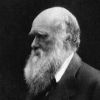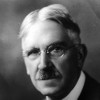“ An individual becomes rational only as he absorbs into himself the content of rationality in nature and in social institutions. ”
John Dewey, Democracy and Education (1916). copy citation
| Author | John Dewey |
|---|---|
| Source | Democracy and Education |
| Topic | rationality institutions |
| Date | 1916 |
| Language | English |
| Reference | |
| Note | |
| Weblink | http://www.gutenberg.org/files/852/852-h/852-h.htm |
Context
“But while French thought upon the whole developed the idea of reason in opposition to the religious conception of a divine mind residing in individuals, German thought (as in Hegel) made a synthesis of the two. Reason is absolute. Nature is incarnate reason. History is reason in its progressive unfolding in man. An individual becomes rational only as he absorbs into himself the content of rationality in nature and in social institutions. For an absolute reason is not, like the reason of rationalism, purely formal and empty; as absolute it must include all content within itself. Thus the real problem is not that of controlling individual freedom so that some measure of social order and concord may result, but of achieving individual freedom through developing individual convictions in accord with the universal law found in the organization of the state as objective Reason.”
source


